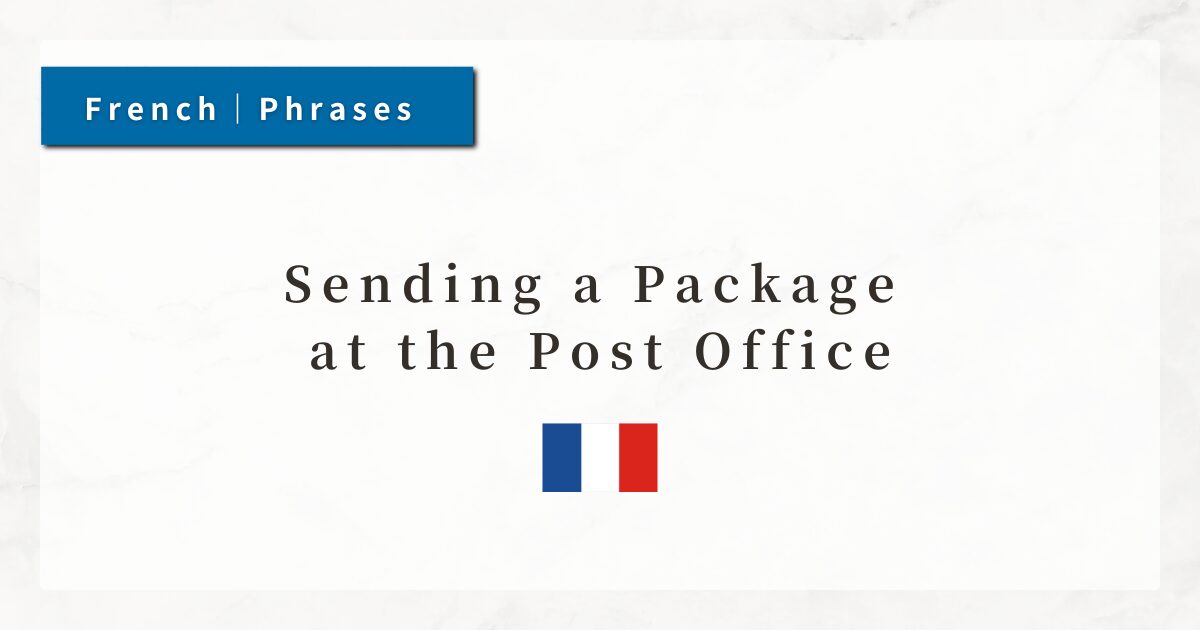#34 Sending a Package at the Post Office|French Travel Conversation

When traveling or studying abroad, you may need to use the post office to send a package to your family or friends.
If you can say basic phrases in French such as “I’d like to send a parcel,” “By airmail, please,” or “How much does it cost?”, the procedure will go much more smoothly.
Here, I will introduce the essential phrases and explain the grammatical structures you need for conversations at the post office.
Dialogue

Bonjour, je voudrais envoyer un colis au Japon.
(Hello, I’d like to send a package to Japan.)

Bien sûr. Par avion ou par bateau ?
(Of course. By airmail or by sea?)

Par avion, s’il vous plaît. Combien ça coûte ?
(By airmail, please. How much does it cost?)

Ça dépend du poids et de la taille du colis.
(It depends on the weight and the size of the package.)

D’accord. Est-ce que je dois remplir un formulaire ?
(Alright. Do I need to fill out a form?)

Oui, voici le formulaire de douane.
(Yes, here is the customs form.)
1. Expressing the Intention to Send a Package
The first thing you need to communicate at the post office is your intention to send something. In French, the polite form is: “Je voudrais envoyer …” (I would like to send …)
- Je voudrais envoyer un colis au Japon.
(I would like to send a package to Japan.)
The verb vouloir (to want) in the conditional present (je voudrais) makes the request polite and soft.
Using “Je veux envoyer …” (I want to send …) sounds too direct, so “Je voudrais …” is more appropriate in service situations.
2. Choosing Airmail or Surface Mail
At the post office, you will be asked whether you prefer airmail or surface mail:
- par avion → by airmail
- par bateau → by sea
The phrase “par + noun” means “by/using ….” Airmail is faster but more expensive, while surface mail is cheaper but may take weeks or months.
3. Asking About the Price
When sending a package, you need to confirm the cost. The simplest phrase is:
- Combien ça coûte ?
(How much does it cost?)
Here, ça means “that,” referring to the service of sending the package. The verb coûter means “to cost.”
- Ça coûte combien pour l’envoyer au Japon ?
(How much does it cost to send it to Japan?) - Combien ça coûte au kilo ?
(How much per kilo?)
4. Asking About Forms and Procedures
For international shipping, you usually need to fill out a customs declaration form (formulaire de douane).
- Est-ce que je dois remplir un formulaire ?
(Do I need to fill out a form?)
Here, devoir (must, to have to) in the present tense (je dois) means “I must.” The verb remplir means “to fill in” or “to complete” a form.
- Est-ce que je dois remplir le formulaire de douane ?
(Do I need to fill out the customs form?) - Je dois signer ici ?
(Do I need to sign here?)
5. Useful Vocabulary at the Post Office
| French | English |
|---|---|
| un colis | parcel |
| une lettre | letter |
| une carte postale | postcard |
| un timbre | stamp |
| un formulaire | form |
| la douane | customs |
In France, stamps (timbres) are sold not only at the post office (la poste), but also at tobacco shops (bureau de tabac).
Summary
- Je voudrais envoyer …
→ polite way to say “I would like to send …” - par avion / par bateau
→ to specify airmail or surface mail - Combien ça coûte ?
→ ask about the cost - Est-ce que je dois remplir un formulaire ?
→ ask about necessary procedures - Essential post office words
→ colis (package), timbre (stamp), formulaire (form), douane (customs)




